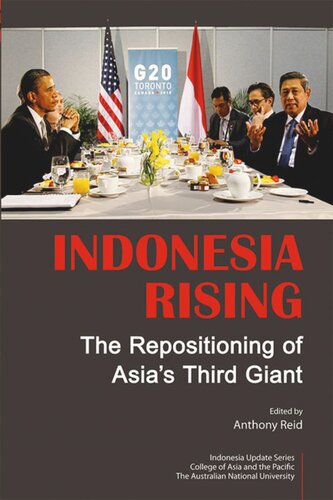

Most ebook files are in PDF format, so you can easily read them using various software such as Foxit Reader or directly on the Google Chrome browser.
Some ebook files are released by publishers in other formats such as .awz, .mobi, .epub, .fb2, etc. You may need to install specific software to read these formats on mobile/PC, such as Calibre.
Please read the tutorial at this link: https://ebookbell.com/faq
We offer FREE conversion to the popular formats you request; however, this may take some time. Therefore, right after payment, please email us, and we will try to provide the service as quickly as possible.
For some exceptional file formats or broken links (if any), please refrain from opening any disputes. Instead, email us first, and we will try to assist within a maximum of 6 hours.
EbookBell Team

4.7
96 reviewsThere are reasons for thinking that this is at last Indonesia's moment on the world stage. Having successfully negotiated its difficult transition to democracy after 1998, Indonesia has held three popular elections with a low level of violence by the standards of southern Asia. Recently its economic growth rate has been high (above 6 per cent a year) and rising, where China's has been dropping and the developed world has been in crisis. Indonesia's admission in 2009 to the G20 club of the world's most influential states seemed to confirm a status implied by its size, as the world's fourth-largest country by population, and the largest with a Muslim majority. Some international pundits have been declaring that Indonesia is the new star to watch, and that its long-awaited moment in the sun may at last have arrived. Those who know Indonesia well, like the experts writing in this book, are less easy to convince. In this volume they weigh the economic evidence (Ross Garnaut and M. Chatib Basri); the political equation between democracy and the massive obstacles to progress in corruption, inefficiency and legal inadequacies (Rizal Sukma and Donald K. Emmerson); and Indonesia's unrealized potential as a leader in matters environmental (Frank Jotzo) and Islamic (Martin van Bruinessen). The volume is rounded out by Scott Guggenheim's analysis of the potential for better performance in education, and by the longer-term considerations of Anthony Reid and R.E. Elson. Overall, the conclusion is one of cautious optimism, well aware of past disappointments. "Perhaps, as the contributors to this eminently readable and thought-provoking volume suggest, Indonesia is finally emerging as the globally significant nation-state that it surely is. A timely and important publication that deserves to be widely read." - Hal Hill, H.W. Arndt Professor of Southeast Asian Economies, The Australian National University